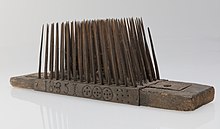hackle
Jump to navigation
Jump to search
English
[edit]



Etymology
[edit]From Middle English hakle (compare the compound meshakele), from Old English hæcla, hacele, from Proto-Germanic *hakulǭ, equivalent to hack + -le. Cognate with Dutch hekel, German Hechel.
Pronunciation
[edit]- (UK) IPA(key): /ˈhækəl/
Audio (Southern England): (file)
- (General American) IPA(key): /ˈhækəl/
- Rhymes: -ækəl
Noun
[edit]hackle (countable and uncountable, plural hackles)
- An instrument with steel pins used to comb out flax or hemp. [from 15th c.]
- (usually now in the plural) One of the long, narrow feathers on the neck of birds, most noticeable on the rooster. [from 15th c.]
- (fishing) A feather used to make a fishing lure or a fishing lure incorporating a feather. [from 17th c.]
- (usually now in the plural) By extension (because the hackles of a rooster are lifted when it is angry), the hair on the nape of the neck in dogs and other animals; also used figuratively for humans. [from 19th c.]
- When the dog got angry, his hackles rose and he growled.
- 1976, Richard Dawkins, The Selfish Gene, Kindle edition, OUP Oxford, published 2016, page 101:
- Suppose it happened to be the case that the majority of individuals raised their hackles only when they were truly intending to go on for a very long time in the war of attrition. The obvious counterploy would evolve: individuals would give up immediately when an opponent raised his hackles.
- A type of jagged crack extending inwards from the broken surface of a fractured material.
- A plate with rows of pointed needles used to blend or straighten hair. [from 20th c.]
- A feather plume on some soldier's uniforms, especially the hat or helmet.
- Any flimsy substance unspun, such as raw silk.
- (uncountable, slang) Pluck; courage or energy.
- 1949, Eric Philbrook Kelly, The Amazing Journey of David Ingram, page 11:
- "COME ALONG YE GRASS-COMBERS, SHOW some hackle," David Ingram, striding ahead, turned back and called.
Usage notes
[edit]In everyday speech, primarily used in phrase to raise someone's hackles (“to make one angry”), as in “It raises my hackles when you take that condescending tone”.
Translations
[edit]instrument with pins
|
feather on the neck of bird
|
fishing: feather or lure
hair on the nape of the neck of animals
|
type of jagged crack
feather plume on soldier's uniform
|
Verb
[edit]hackle (third-person singular simple present hackles, present participle hackling, simple past and past participle hackled)
- To dress (flax or hemp) with a hackle; to prepare fibres of flax or hemp for spinning. [from 17th c.]
- 1891, Mary Noailles Murfree, In the "Stranger People's" Country, Nebraska, published 2005, page 155:
- Then, with a smile that seemed to have all the freshness of the matutinal hour in it, she bent again to her work of hackling flax.
- (transitive) To separate, as the coarse part of flax or hemp from the fine, by drawing it through the teeth of a hackle or hatchel.
- (archaic, transitive) To tear asunder; to break into pieces.
- 1790 November, Edmund Burke, Reflections on the Revolution in France, and on the Proceedings in Certain Societies in London Relative to that Event. […], London: […] J[ames] Dodsley, […], →OCLC:
- the other divisions of the kingdom being hackled and torn to pieces
Derived terms
[edit]Translations
[edit]dress flax or hemp
Further reading
[edit] hackle on Wikipedia.Wikipedia
hackle on Wikipedia.Wikipedia  hackle (disambiguation) on Wikipedia.Wikipedia
hackle (disambiguation) on Wikipedia.Wikipedia
Anagrams
[edit]Categories:
- English terms inherited from Middle English
- English terms derived from Middle English
- English terms inherited from Old English
- English terms derived from Old English
- English terms inherited from Proto-Germanic
- English terms derived from Proto-Germanic
- English terms suffixed with -le
- English 2-syllable words
- English terms with IPA pronunciation
- English terms with audio pronunciation
- Rhymes:English/ækəl
- Rhymes:English/ækəl/2 syllables
- English lemmas
- English nouns
- English uncountable nouns
- English countable nouns
- en:Fishing
- English terms with usage examples
- English terms with quotations
- English slang
- English verbs
- English transitive verbs
- English terms with archaic senses
- en:Hair
- en:Flax